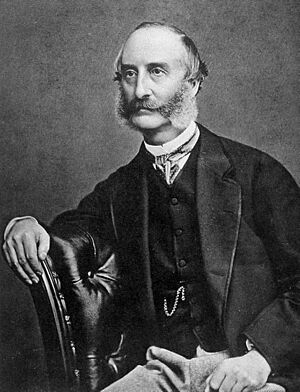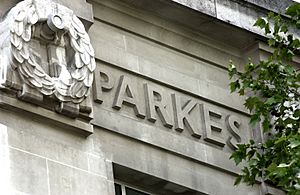Edmund Alexander Parkes facts for kids
Edmund Alexander Parkes (born in 1819, died in 1876) was an important English doctor. He is best known for his work in hygiene, especially for soldiers. Hygiene is about keeping things clean and healthy to prevent diseases. His ideas helped make armies healthier and saved many lives.
Contents
Early Life and Medical Training
Edmund Parkes was born in Bloxham, Oxfordshire. He went to school at Christ's Hospital, London and studied medicine at University College London. By 1841, he had earned his medical degree.
At a young age, he worked with his uncle, Anthony Todd Thomson, who was also a doctor. Parkes even lectured for his uncle on topics like medicines and medical law.
In 1842, when he was just 22, Parkes joined the army as an assistant-surgeon. He traveled to India, where he gained experience treating tropical diseases. He saw many cases of dysentery, hepatitis, and cholera. These experiences showed him how important good health practices were.
After leaving the army in 1845, he returned to England. He continued his medical studies and became a professor of clinical medicine at University College. He also worked as a doctor at University College Hospital.
Renkioi Hospital: A New Kind of Hospital
Building a Hospital for Soldiers
During the Crimean War (1853-1856), many soldiers were getting sick, not just from battles, but from poor conditions in hospitals. In 1855, the government asked Dr. Parkes to go to Turkey. His job was to find a place for a new, large hospital and then set it up. This hospital was meant to help ease the pressure on other crowded hospitals.
Parkes chose a place called Renkioi, on the Asian side of the Dardanelles strait. The hospital built there was quite special. It was a 1,000-patient hospital made from prefabricated (meaning built in sections elsewhere and then put together) timber. The famous engineer Isambard Kingdom Brunel designed it.
A Focus on Cleanliness
Dr. Parkes stayed at Renkioi Hospital until the war ended in 1856. This hospital was known for being very well-organized and clean. It had its own nursing staff, chosen by Parkes himself. Unlike some other hospitals at the time, Renkioi Hospital was outside the direct control of Florence Nightingale, though it shared her focus on hygiene.
Later Life and Military Hygiene
Teaching Hygiene to the Army
In 1860, an Army Medical School was created in Chatham, Kent. Dr. Parkes was asked to lead the hygiene department. He helped design the way soldiers and medical officers would be taught about health and cleanliness.
In 1863, the school moved to the Royal Victoria Hospital in Netley. Parkes continued his important work there. He was often involved in official investigations about hygiene for the army. For example, he helped change the heavy knapsacks soldiers carried to lighter, more practical valise equipment.
Parkes was also a member of important groups like the General Medical Council and the Royal Society. These roles showed how respected he was in the medical world.
Death and Lasting Impact
A Legacy of Health
Dr. Parkes passed away in 1876 at the age of 56 from tuberculosis. He left behind a huge legacy in public health and military hygiene.
After his death, several memorials were created to honor him:
- A museum of hygiene was started at University College, London. It later moved and became the Health Exhibition Centre, teaching people about health.
- At Netley, where the Army Medical School was, a special prize was set up. It was given every three years for the best essay on hygiene by military doctors. A medal was also given to the best hygiene student each year.
Important Works and Discoveries
The Manual of Practical Hygiene
One of Parkes's most famous works was his Manual of Practical Hygiene, first published in 1864. This book became a standard guide for hygiene, especially in the military. It was translated into many languages and was used for decades. It taught about clean air, water, and living spaces, following old medical traditions.
Other Key Contributions
Parkes wrote many other important papers and books:
- He studied diseases like dysentery and cholera, which he had seen in India.
- He edited a book on skin diseases by his uncle.
- He researched how diet and exercise affect the body. He showed that muscle work doesn't destroy muscle tissue as much as previously thought.
- He also studied the effects of alcohol on the human body, especially on soldiers. He found that alcohol could lower body temperature and affect heart rate.
- He wrote about how medical students should be trained, emphasizing practical lab work and early clinical experience.
His work helped change how armies and societies thought about health, leading to better conditions and fewer diseases.
Recognition
Edmund Parkes' name is featured on the Frieze of the London School of Hygiene & Tropical Medicine. This frieze lists 23 pioneers in public health and tropical medicine. Their names were chosen to be displayed on the school building when it was built in 1926, showing their lasting importance.
 | Stephanie Wilson |
 | Charles Bolden |
 | Ronald McNair |
 | Frederick D. Gregory |



